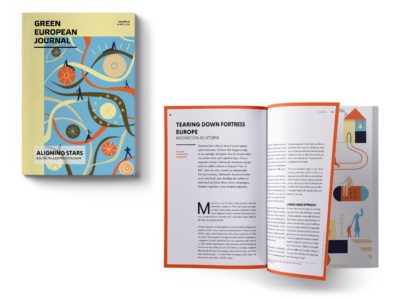Before revealing itself in its vastness and fragility, Europe evoked to poet Nikola Madžirov nothing but the sweetness of chocolate from a factory in Skopje.
I was born in a country where pity is a way of loving – when asked “How are you?”, people respond with “God save us from worse!” I grew up in a town on a border crossing between three states and flags torn by the wind and the inherited hatred. The silence of fear was strongest at the borders where air warfare was waged between various state radio stations, and the space filled with static between two radio stations was my home. I didn’t want anyone to understand me and wished not to understand the languages when I stood in front of a border crossing or in front of the silence at Joseph Brodsky’s grave, near the water and the passing time.
On my first trip to Venice, I bowed to the water’s vitality and its memory, I looked for Titian in the streets and on the walls of the churches, even though his “The Rape of Europa” had long since moved to the other side of the Atlantic Ocean. Before I was confronted with the mythological European narrative, which later became geopolitical, Europe for me was nothing but the name of the only chocolate factory in Skopje before the disintegration of Yugoslavia. Something sweet.
Later, my grandfather, the most famous confectioner and double bass player in the city (there were no others), told me there was also bitter chocolate in Europe – an oxymoron that was foreign to us children who had grown up with the ideological puritanism of state socialism, that soup can only be salty, cheese only white, and the poet only as glorious as the country.
For fifteen years now, I have lived outside the contexts of a permanent home and the geographies of belonging. About twenty years ago I put on the uniform because the country said I had to. I was a soldier between two wars in the Balkans – it’s easier to put it that way than to say I was a soldier in peacetime. Fragility is my only weapon nowadays.
For a long time, the word FRAGILE was a sticker on the cardboard boxes of the televisions or glass display cabinets sold by my father, which people filled with heaps of plates and glasses they only used when there were weddings and funerals at home.
Before I acquired the alphabet of meanings, FRAGILE was a sign of untouchability, a synonym for danger rather than frangibility. Europe’s fragility is dangerous because you can’t see it – a cracked stone in a mosaic that resists time and predatory diggers. I love Europe for its imaginative and real vastness, which allows me to be alone when I don’t want to return to the room of narrow geographical or literary definiteness. I travel with the language to a place where I wish we could communicate with just one look – with a look at the beauty or at the sky as depth or symbol, that sky that is counterpoint of all aggressions, like Kurosawa’s skies in Rashomon. Europe is built of languages, perhaps that is why it is fragile, organic, indomitable. Maybe I sound romantically naïve, but I think we travel to carry words, stones, dust, hopes.
But I always returned home to see my son growing faster than my longing for a safe home, I returned to the language of my childhood, to the words that allowed me to travel through the interstices and various silences – the two things that create me as I create. “Silence is my most majestic, my most peaceful, but also my clearest declaration of war or manifestation of contempt,” Derrida wrote. In the silence I feel safe, despite the loud noise of passport stamping, a civilisational sign that now makes it possible to cross the borders drawn after the wars.
Translation by Pavlina Manavska.

